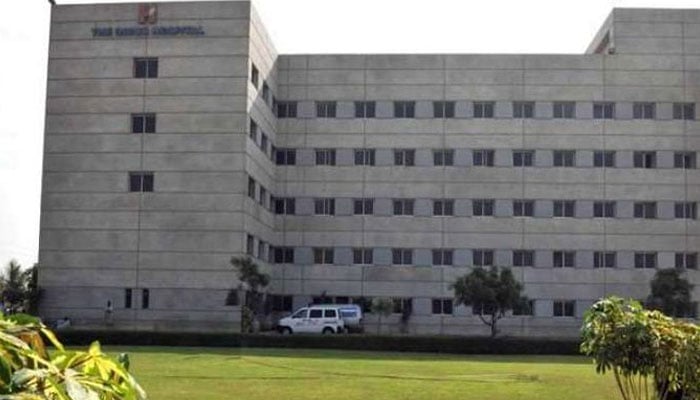KU institute helps Indus Hospital increase COVID-19 diagnosis capacity
The collaboration between the National Institute of Virology at the University of Karachi’s Dr Panjwani Centre for Molecular Medicine & Drug Research and The Indus Hospital (TIH) has resulted in significant improvements in the latter’s capacity to diagnose COVID-19 cases.
According to a statement, the diagnosis capacity of TIH has been tripled due to its collaboration with the virology institute, which has provided four real-time PCR machines and qualified virology experts to the hospital so that working burden of diagnosis could be handled easily.
KU International Centre for Chemical and Biological Sciences (ICCBS) Director Prof Dr M Iqbal Choudhary attended a meeting of virology experts in this regard at the National Institute of Virology, which was attended by senior research officer of the institute Dr Muhammad Rashid, Dr Ammar Ather and other scientists.
“The hospital, which is working in collaboration with the government of Sindh, was facing immense working load in the process of diagnosis due to increasing number of coronavirus cases in Sindh,” Prof Choudhary said.
He added that a major challenge currently in Pakistan is very limited diagnostic capabilities and the World Health Organisation has declared the timely diagnosis of COVID-19 as a major step in stopping its spread as undetected infected individuals are the biggest source of infecting others.
Due to current health challenges, Dr Panjwani Centre decided to run a major joint operation with the Indus Hospital, the largest charity health establishment of Pakistan and have provided four state-of-the-art RT-PCR machines and trained personnel to the hospital, he said. PCR is the abbreviation of polymerase chain reactions and PCR machines are sophisticated machines on which actual tests of COVID -19 are carried out, he maintained.
Prof Choudhary said: “Indus Hospital is currently the epicentre of all COVID-19 related activities in Sindh, which is the worst-hit province of Pakistan with 65 per cent confirmed cases.”
Through the help of the ICCBS, the current daily testing capacity of the Indus lab has increased from 800 to 2,400 persons, he added. “We think it is an excellent example of a university-based research centre helping the national health care system at the time of national health emergency.”
Prof Choudhary said precaution was the only weapon to fight against the emerging threat of the 2019 novel coronavirus. He said the National Institute of Virology which works under the Dr Panjwani Center was working to produce quality research and researchers who could play their due role in the areas of research and development in the country.
Dr Rashid said people must avoid public gatherings. He said large grocery stores and shopping malls should not be used for shopping and open street shops where people are not gathered in large numbers are better options for buying groceries.
He added that children should not be allowed to go outside as these holidays were announced in case of an emergency, not for a picnic. Dr Ather said citizens must take preventive measures that could keep them safe against the deadly coronavirus. He added that the citizens were advised to practise the best hygiene and wash their hands frequently and thoroughly, or use an alcohol-based hand sanitiser if soap and water were not available.
-
 Luke Grimes Reveals Hilarious Reason His Baby Can't Stop Laughing At Him
Luke Grimes Reveals Hilarious Reason His Baby Can't Stop Laughing At Him -
 Why Kate Middleton, Prince William Opt For ‘show Stopping Style’
Why Kate Middleton, Prince William Opt For ‘show Stopping Style’ -
 Here's Why Leonardo DiCaprio Will Not Attend This Year's 'Actors Award' Despite Major Nomination
Here's Why Leonardo DiCaprio Will Not Attend This Year's 'Actors Award' Despite Major Nomination -
 Ethan Hawke Reflects On Hollywood Success As Fifth Oscar Nomination Arrives
Ethan Hawke Reflects On Hollywood Success As Fifth Oscar Nomination Arrives -
 Tom Cruise Feeling Down In The Dumps Post A Series Of Failed Romances: Report
Tom Cruise Feeling Down In The Dumps Post A Series Of Failed Romances: Report -
 'The Pitt' Producer Reveals Why He Was Nervous For The New Ep Of Season Two
'The Pitt' Producer Reveals Why He Was Nervous For The New Ep Of Season Two -
 Maggie Gyllenhaal Gets Honest About Being Jealous Of Jake Gyllenhaal
Maggie Gyllenhaal Gets Honest About Being Jealous Of Jake Gyllenhaal -
 'Bridgerton' Star Luke Thompson Gets Honest About Season Five
'Bridgerton' Star Luke Thompson Gets Honest About Season Five -
 Prince William On Verge Of Breakdown Because Of 'disgraced' Andrew
Prince William On Verge Of Breakdown Because Of 'disgraced' Andrew -
 Tig Notaro Reflects On Oscar Nod For 'Come See Me In The Good Light': 'I Was Sleeping'
Tig Notaro Reflects On Oscar Nod For 'Come See Me In The Good Light': 'I Was Sleeping' -
 Kenyon Sadiq Sets 40-yard Dash Record At NFL Scouting Combine, Eyes First Round
Kenyon Sadiq Sets 40-yard Dash Record At NFL Scouting Combine, Eyes First Round -
 Talk Show Host Drops Hint About Taylor Swift, Travis Kelce Wedding Date
Talk Show Host Drops Hint About Taylor Swift, Travis Kelce Wedding Date -
 Andrew Scandal Brings New Worries For Prince Harry, Meghan Markle
Andrew Scandal Brings New Worries For Prince Harry, Meghan Markle -
 King Charles Imposes New Restrictions On Ex-Prince Andrew In Surprise Move
King Charles Imposes New Restrictions On Ex-Prince Andrew In Surprise Move -
 Chris Hemsworth Reveals How Elsa Pataky Guides His Career Moves
Chris Hemsworth Reveals How Elsa Pataky Guides His Career Moves -
 Was Travis Barker In A Relationship With Kim Kardashian Before Marrying Her Sister?
Was Travis Barker In A Relationship With Kim Kardashian Before Marrying Her Sister?




